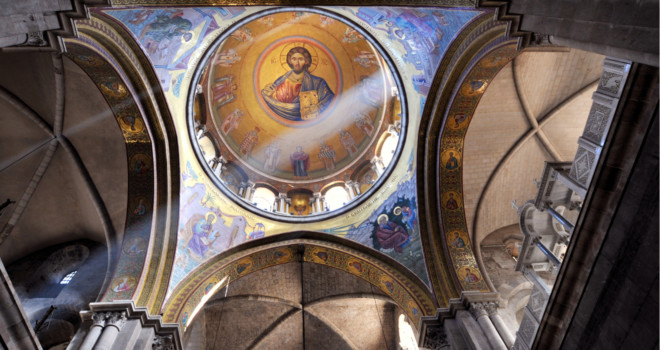Holiness is the Perfection of Charity
St. Thomas Aquinas describes holiness as the perfection of charity. This makes sense because Scripture tells us that God is love and that He is holy. Therefore, to be holy is to be like God and to love perfectly. But how do we know of God’s love? And what does perfect love look like?
St. John tells us, “For God so loved the world that he gave his only-begotten Son, that whoever believes in him should not perish but have eternal life” (John 3:16). God’s love is revealed in the Paschal Mystery, that is, the life, Passion, death, and Resurrection of Jesus. St. Paul adds, “God shows his love for us in that while we were yet sinners Christ died for us” (Rom. 5:8).
In other words, when we look at a crucifix, we see what love looks like. There is no greater love than to lay down one’s life for another. By His life, death, and Resurrection, Jesus reveals the Father to us in His Person: “[Jesus] is the image of the invisible God” (Col. 1:15). The Son has shown us the love of the Father by becoming human and suffering and dying for our redemption.
Sacrifice, Self-forgetfulness, & Acceptance
When we look at God’s love, we see three essential qualities, the first being sacrifice. God the Father sacrifices His only begotten Son and sends Him into the world to become human, to suffer and die, so that we may have eternal life. The Father cannot possibly sacrifice any more — He is giving us everything by sacrificing what is most precious to Him: His only begotten Son. We see the same sacrifice in the Son, who, out of love for the Father and for us, becomes incarnate to suffer and die so that we may live. The Son cannot possibly sacrifice any more for us.
In this sacrifice, we see the necessity of self-forgetfulness, which is the second quality of God’s love. Part of the great mystery of the kenosis, or self-emptying, of the Son of God in the Incarnation is that He humiliates Himself completely by taking a created human nature. This kenosis is heightened even more by the Lord’s Crucifixion in His human nature. While the incarnate Word always knows Himself to be one of the Trinity by virtue of the beatific vision He possesses at every moment — even on the cross — we might analogically or metaphorically say He “forgets Himself” insofar as He empties Himself in total humility to assume our nature and suffer on our behalf.
The third quality of God’s love is acceptance. The Father has created us with free will, and He accepts the fact that many will reject the gift of His only Son for our eternal life. Similarly, the Son accepts that many will spurn His love and reject the complete gift of Himself. Even those who believe in and accept God’s love experience weaknesses, ingratitude, and sinfulness, which He lovingly accepts.
Imitating the Love of God
Nevertheless, we are called to imitate and reciprocate that perfect love. St. John puts it this way: “We love, because he first loved us” (1 John 4:19). We try to love God with the same kind of love with which He loves us. This calls for sacrifice, self-forgetfulness, and acceptance. For love to be authentic, there must be an element of sacrifice. We must give up something that is valuable and dear to us. Love is not just a warm and fuzzy feeling; it must cost us. Many Catholics are not even willing to sacrifice one hour a week to go to Mass; still others are unwilling to sacrifice time to pray, to do works of charity, or to give up meat on Fridays during Lent.
Similarly, love requires that we forget ourselves to consider the good of others. But we tend to be self-absorbed. To love God is to forget our self-interest and think of honoring and glorifying the name of the Lord. With trust in God’s providence and goodness, we must accept all the pain, confusion, and desolation that may accompany self-forgetful love. It is easy to say, “Lord, I love you,” but God tells us, “Show me your love.” Indeed, actions speak louder than words. Our love for God must be manifested in our lives by concrete actions performed as gifts of self to the Lord. Everything we do can become a gift for the Lord when we do it with that specific loving intention.
We have only our time on earth to perfect our love. In heaven, we can neither grow in love nor merit an increase in virtue. Our time to merit graces and grow in charity and holiness is limited to this life. If we have not yet reached perfection when we die, we will have to be purified in purgatory before we can see God face-to-face in heaven. The Catechism tells us: “All who die in God’s grace and friendship, but still imperfectly purified, are indeed assured of their eternal salvation; but after death they undergo purification, so as to achieve the holiness necessary to enter the joy of heaven.”
We have a limited time on this earth to perfect our charity. We do so by loving, that is, by performing acts of charity, purifying our motives, and living for God and His glory. The more we perform each action with the intention of doing our best out of love for God, the more the action is sanctified and has value in God’s eyes, and the more we merit graces to continue to grow in charity. It is the exercising of our free will for the greater honor and glory of God that helps us perfect our charity and grow in holiness.
Mary & the Saints: Models of Holiness
Mary and the saints are models of the perfection of charity and holiness. They have conformed their love to that of Jesus in a radical way. All the martyrs throughout the history of the Church refused to deny Christ. They sacrificed their lives, forgetting themselves and accepting suffering and death. Likewise, Mary gave herself completely to the Lord, forgetting herself and living only for the honor and glory of God, while accepting whatever pain and suffering God allowed to come her way.
Mary imitates and reciprocates God’s perfect sacrificial love; hence, she is showered with graces from above. In turn, Mary does not waste an ounce of grace but responds even more generously in loving and living for the Lord.
We can never really have enough time to show God our love for Him. The prolific writer Fr. Henri Nouwen stressed this reality to his students at Yale Divinity School. On the first day of his theology class, he would take chalk and draw a long horizontal line from one end of the chalkboard to the other. Then, he would explain that this long line represented God’s love for us:
“God loved you before you were born, and God will love you after you die. In Scripture God says, ‘I have loved you with an everlasting love.’ This is a very fundamental truth of your identity. This is who you are whether you feel it or not.”
— Henri J.M. Nouwen, Finding My Way Home: Pathways to Life and the Spirit (Chestnut Ridge, NY: Crossroad Publishing, 2018), 129.
Then, in the middle of the horizontal line, he would draw two small vertical lines to indicate our limited time on earth. Fr. Nouwen would tell his students, “Your time on earth is just a short opportunity for you to say to God, ‘I love you, too.’ ”
Truly, we do not have enough time in this short life to show our love for God. We can never return to God the love He has given us. Therefore, we must not waste a single minute by not loving the Lord.
✠
This article is an excerpt from Fr. Tran’s new book, The Imitation of Mary: Keys to Growth in Virtue and Grace. It is available as an ebook or paperback from your favorite bookseller and Sophia Institute Press.
image: Church of the Holy Sepulcher, Jerusalem via Xuanlu Wang / Shutterstock.com














